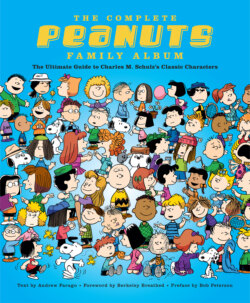Читать книгу The Complete Peanuts Family Album - Andrew Farago - Страница 20
На сайте Литреса книга снята с продажи.
Оглавление27CHARLIE BROWN
CHARLIE BROWN
g
ood ol’ Charlie Brown, unlucky at love, unlucky at
school, unlucky at sports. You name it—he finds
some new and unusual ways to fail at it. But no matter
what life throws at the wishy-washy, round-headed kid, he
always tries his best and never gives up.
Charlie Brown eats, sleeps, and breathes baseball, but
his love for the game never leads to success on the field.
Each spring, he manages the world’s worst team through
yet another losing season. His performance as the team’s
pitcher results in some of the most spectacular highlights
ever witnessed on the baseball diamond—for the other
team. His cap, shirt, shoes, and socks are knocked off by
line drives, and he even spends an inning upside down
after a really solid hit. And with the exception of two home
runs in his entire Little League career, he never comes
through with a clutch performance when a close game is
on the line.
His athletic difficulties aren’t confined to a single
season, as he’s equally hapless at all sports. Every year,
Lucy convinces him to attempt a placekick while she
holds a football for him, and every year, she pulls it away
and he lands flat on his back. Even the gentle pastime of
kite flying has proven dangerous for him: He either ends
up hopelessly tangled up in miles of string or stands by
helplessly as the Kite-Eating Tree devours his latest flyer.
Charlie Brown is a thoroughly average student,
although he could probably be an “A” student if not for his
insecurities and performance anxiety. Fear of failure, fear of
success, and, as Lucy once successfully points out, “fear of
everything” always seems to hold him back. His unrequited
crush on his classmate known only as the Little Red-Haired
Girl goes unfulfilled in part because he can never bring
himself to approach her. As he once observes, “They say
opposites attract. . . . She’s really something and I’m really
nothing. . . . How opposite can you get?”
Despite his anxieties, or possibly because of them, his
friends appreciate his company and know that they can
always count on good ol’ Charlie Brown, whether he wins
or not. As Linus says, “Of all the Charlie Browns in the
world, you’re the Charlie Browniest!”
Charles Schulz and his lead character shared many
similarities, and Schulz projected many of his own
insecurities onto Charlie Brown. These universal feelings
of anxiety and melancholy have been embraced by
generations of readers worldwide. “Charlie Brown is the
ultimate loser; that is both his magic and his destiny. If he
weren’t a loser, he’d have no incentive to keep on trying.
The secret is not necessarily to win over adversity, but
never to stop trying. That’s the key, perhaps, to the human
condition. Charlie Brown is the world’s champion tryer. I
think that’s important.”
Charlie Brown rarely caught a break under the pen of
Charles Schulz, and that’s a big part of his universal appeal.
“I know one thing, humor doesn’t come from a happy
situation. Happy is not funny. Funny is when something
happens to someone else and you identify with it and
laugh at the luckless one at the same time. Disasters afflict
Charlie Brown that come to all of us sometime; but to
Charlie, everything bad happens all the time. He never gets
anything right. But a nice kid. I like Charlie Brown.”
opposite: Spot art from strip – Charles M. Schulz
first aPPearanCe
10/02/1950
